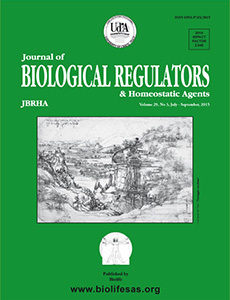JOURNAL OF BIOLOGICAL REGULATORS & HOMEOSTATIC AGENTS
D. LAURITANO1, F. CURA2, V. CANDOTTO3, R.M. GAUDIO4, D. MUCCHI3 and F.CARINCI3
11Department of Translational Medicine and Surgery, Neuroscience center of Milan, University of Milano Bicocca, Monza, Italy;
2Department of Surgical and Morphological Sciences, University of Insubria, Varese, Italy;
3Department of Morphology, Surgery and Experimental Medicine, University of Ferrara, Ferrara, Italy;
4Department of Medical Sciences, University of Ferrara, Ferrara, Italy
Helicobacter pylori (HP) is one of the most common gastric infections in the world, affecting about half the world’s population, and is the principal cause of adenocarcinoma of the distal stomach. It seems that HP infects the subject early in life and is transmitted from person to person. The HP reaches the stomach through oral ingestion, and because of its non-invasive nature, the stomach is the ultimate site of colonization. Recently, it has been debated whether the oral cavity is a reservoir of HP bacteria participating in infection transmission, or representing a nidus of re-infection after eradication of the bacterium. HP and recurrent aphthous stomatitis (RAS) show similar clinical and histological findings, and the discovery of HP in RAS ulcers support the idea of a correlation between the two diseases. Another important relationship between RAS and HP is the high incidence of anemia in patients with RAS that may be caused by HP-positive stomach disease. In fact, antibiotic therapy and treatment of anemia can reduce the frequency of RAS ulcer recurrence. HP is considered a carcinogenic agent type 1 of the stomach by the International Agency for Research on Cancer. In conclusion, the oral cavity is an extra-gastric reservoir of HP and periodontal therapy associated with systemic therapy can better eradicate HP from the mucosa of all gastro-enteric tract, reducing relapse of HP infection. Prospective cohort studies are needed to demonstrate the bacterial action in the oral cavity.

